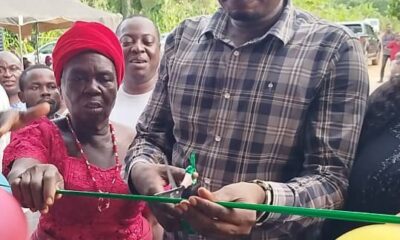CAMPUS REPORTS
Digital Platforms Expand Learning in Nigeria Amid Challenges

Millions of students, especially at secondary and tertiary education levels, are increasingly taking advantage of virtual learning platforms across the country.
For many of them, virtual schools have become a better alternative to the physical school system often characterised by inhibitions such as unfriendly attitudes by instructors, and harsh learning environment, among other concerns. Virtual learning platforms are short timed with concise, precise and informative course modules.
Chiamaka Obiefuna, a 300-level student of the Department of Cooperative Economics and Management, Nnamdi Azikiwe University, Awka, is a beneficiary of this system of learning. In her submission, online learning platforms have revolutionized access to education, breaking geographical barriers and providing flexible learning opportunities.
The self-paced platforms, offering access to global instructors, and several courses possibly unavailable locally, are crucial for lifelong learning and professional development.
“I’ve found online learning platforms incredibly useful. The ability to take courses from world-renowned institutions, learn new skills, and engage with diverse perspectives has been enriching. The convenience of learning from anywhere at any time makes the experience enjoyable,” Obiefuna recalls.

Chiamaka Obiefuna, NAU Student
Precious Christopher is still thrilled by the way virtual learning platforms sustained Nigeria’s education sector during the COVID-19 pandemic. “Since the COVID-19 era, e-learning platforms have reduced optimally the stress and high costing that comes with traditional school, while offering flexibility and personalization of learning.
“During my school days, when I did not understand certain topics due to the unfriendly attitudes of teachers and the mockery from other students, I would keep quiet and later go to take advantage of virtual school.”
As a professional, Christopher is still maximising the benefit of online learning in her career. “My field, “Diplomacy” requires a constant search for knowledge and E-learning has been my coping mechanism.

Precious Christopher
“I am currently running a course on Edx learning; Understanding Poverty and Inequality and I wouldn’t have coped well doing that in conventional school, as an educator and volunteering for SDGs-related projects.”
Physical disability cannot stop some resolute young Nigerians, who have resolved to rise above their visible limitation to attain greater heights in their chosen careers.
Yusuf Afolabi, a Lagos-based visually impaired graduate, is one of them. “I earned professional certifications from CISCO and COURSERA between December 2021 and December 2023, as a MTN scholar. Honestly, I can literally be in my pajamas, chilling in my room and still attend classes or do research. No commuting stress, no scrambling to find a seat in a crowded lecture hall. That’s a definite win,” Afolabi submitted.
John Adoyi, another 2024 visually impaired Mass Communication graduate of University of Nigeria, Nsukka (UNN), is also a beneficiary of virtual classrooms which have made learning easier and faster. “I don’t need to sit in a classroom with over 200, under the hot weather which slows down learning listening to the lecturer teaching over 500 students at once. Besides, I can always go back to every lecture which was recorded with the same virtual classroom feature.”
Faustina Ezeukwu also shares good tidings about the platforms. “Online learning platforms are contributing greatly to the educational system in Nigeria, especially for people who are trying to upskill or learn new courses. I’ve enjoyed using such platforms such as HIIT, Alx, Shecodes, Google among others.”
The Evolution
The evolution of online learning has been driven by technology and changing educational needs. From early computer-based training like Programmed Logic for Automatic Teaching Operations (PLATO) in the 1960s to the internet boom of the 1990s, e-learning surged with the World Wide Web’s 1991 debut, enabling seamless content sharing and communication.
The first fully online university, CalCampus, was established in 1994, offering distance education, while companies and universities started offering online degree programmes and corporate e-learning modules late 1990s. Institutional adoption of e-learning was witnessed in the 2000s as major universities, including Massachusetts Institute of Technology (MIT) (MIT OpenCourseWare in 2002), started offering free online materials.
Coined in 2008, the term Massive Open Online Courses (MOOCs) marked a major shift toward large-scale, free online courses birthing platforms like Coursera, Udacity, and edX offering MOOCs from top universities. In 2015, mobile learning grew rapidly with smartphone accessibility, allowing for bite-sized and on-the-go learning, while Virtual Reality (VR) and Artificial Intelligence (AI) got integrated into e-learning for interactive experiences in 2016.
The COVID-19 pandemic accelerated digital education worldwide, including in Nigeria. Hybrid learning, AI tutors, and gamification became mainstream, while AI-driven personalization, blockchain credentials, and metaverse education further enhanced virtual learning.
Challenges
Despite the easy access it offers, digital learning system has not been all-rosy for Nigerians, who face many inhibitions in completing their courses.
For Christopher, the frustrations are countless. “I cannot remember all the frustrations, but a very recent one was at Forward Learning by McKingsey, a 10-week certificate self-development programme on “Accelerate”.
“Access to the Course’s Modules required a very good internet connectivity which I didn’t have. I ended up losing the course. Even the course I was running recently on Poverty and Inequality is also facing similar challenge. I hated the time for Forward Learning because of my regular battle with poor connectivity. Due to poor internet, I abandoned it again.”
Afolabi equally shared his untoward encounter with virtual learning system. “I have experienced connectivity challenges on many occasions both in urban and rural areas. It seriously affected my grades because I couldn’t attend classes consistently or collaborate with classmates on group projects. It was incredibly demotivating.”

Yusuf Afolabi
“I honestly start questioning if online learning is even worth the hassle. You’re constantly fighting with buffering screens and dropped connections. It kills momentum and makes it hard to stay engaged,” complained.
Elizabeth Ikele, a physically challenged graduate of English and Literature, similarly recounted her experience: “I’ve encountered poor internet connection during the Accenture Employability Skills training. But it didn’t really affect my ambition much. I was still able to subsequently continue and complete my learning process”.
Obiefuna was not spared. “I couldn’t access the lessons for a few days, and I lost my daily learning streak despite that I had been consistent for weeks. It was a setback, but I eventually got back on track. It taught me about how unreliable internet access can impact learning progress,” said.
Ezeukwu, who is based in Awka, Anambra State, also has a tale of woes. “I live in an urban area but most times it seems there’s a blackout in network. Imagine this happening for a day or two, while your colleagues are moving on with their course submitting assessments and quizzes.
“This has happened to me a couple of times and I had to wake up at night. Even at that, I eventually dropped off a course because it required a lot of time.”
Rising data tariffs
Respondents all viewed the recent hike in data tariff as capable of slowing down the rate at which Nigerians take advantage of online courses for advancement. “When I was learning a course online, I had to opt for night plan for affordable data to enable me to finish my courses. Data tariff increase will greatly affect the online learning process,” Ezeukwu submitted.
“Despite that we have co-working spaces that offer internet access and electricity, it is still relatively expensive and unaffordable for an average person as they charge up to N4,000 for 8 hours”.”
Despite its downside, respondents overwhelmingly believe that virtual school is the future of learning. “The benefits far outweigh the challenges. Online learning is the future, and as technology improves, the experience will only get better,” Obiefuna said, supported by Ikele.
“Sure, I still believe in online learning platforms, though they can be improved upon with stronger and better internet connectivity and clearer navigation guides.”
Apart from network connectivity issues, the interface of some of the platforms can be very challenging. “Some of those platforms are still kind of difficult to use due to their interface. If those interfaces can be worked on, places like coursera and Cisco can become better,” Adoyi stressed.
Government Efforts to Expand Digital Learning
To be at par with the rest of the world, Nigeria, through the Federal Ministry of Education, has developed many online education platforms to enhance learning accessibility for students.
One of them is the Nigeria Learning Passport, (NLP), developed in collaboration with UNICEF to offer online, mobile, and offline access to curriculum-aligned educational resources for pre-primary, primary, and secondary education levels. Its comprehensive content provides more than 15,000 interactive lessons, digital textbooks, and self-paced modules tailored to the Nigerian curriculum.
It can be accessed with limited or no internet connectivity and has a user-friendly interface, making it convenient for students, teachers, and parents to navigate it.
NLP permits equitable learning as learners in internet-disadvantaged remote areas benefit from structured feedback and performance tracking.
Also, the eLearn Platform, a centralised platform offering high-quality, curriculum-aligned educational resources, including interactive exercises, videos, and texts. As a resource for both learners and teachers, eLearn platform facilitates independent learning and enriching classroom experiences.
In addition, the E-Learning Resources initiative gives students access to high-quality educational materials to improve learning outcomes. It offers structured materials for all subjects approved by the West African Examinations Council (WAEC) and is bridging the rural-urban digital divide by making resources available online and ensuring equitable learning opportunities for all students.
However, unlike the Nigerian Learning Passport, e-Learn platform and E-Learning Resources do not have features that allow interaction between students and educators.
Expert Opinion
A digital learning expert, Ifeoluwa Obanla, gave further insight into issues surrounding online learning system in Nigeria including infrastructure, policy, socioeconomic conditions, and cultural attitudes.
Obanla agreed that poor and unstable internet connectivity, as well as epileptic power supply, are setbacks. “There is limited broadband access, especially in rural areas as well as high cost of internet data and unreliable network services. These are worsened by frequent power outages affecting online learning consistency.
“Besides, digital learning devices are costly and beyond the reach of average Nigerians. Many students and teachers don’t have laptops, smartphones, and tablets and cannot afford modern supporting devices. Digital literacy among students and educators is still low with many older educators resisting digitization of learning.”
Nigeria is equally believed to lack clear national policies supporting online education with minimal investment in digital infrastructure for public schools and universities.
There is also the problem of insufficient funding for e-learning research and development.
“Cybersecurity and digital safety concerns are also real. People fear data breaches, online fraud, and cyberbullying as many institutions lack cybersecurity measures to protect students and staff,” Obanla noted.
There are also the cultural and parental influence, as majority of Nigerians still prefer the traditional face-to-face learning to digital education. Parents are equally skeptical about the effectiveness of online learning compared to physical classrooms.
Concerns Being Addressed
As of January 2025, Nigeria’s internet penetration rate was approximately 44%, leaving more than half of the entire country waiting for coverage. Residents of those unserved areas (mostly rural) cannot take advantage of virtual learning platforms unless they relocate to any of the parts already penetrated.
Realizing the fact that internet connectivity is the soul digitization and data exchange, the Nigerian Communications Commission (NCC) earlier in 2025 launched the National Broadband Alliance for Nigeria (NBAN) initiative, aiming to increase broadband penetration to 70% by the end of 2025.
On the occasion, the Minister, Minister of Communications, Innovation & Digital Economy, ‘Bosun Tijani, represented by NCC’s Executive Vice-Chairman, Aminu Maina, said, “Despite our collective goals of achieving 70% broadband penetration by the end of 2025; delivering minimum data speeds of 25 Mbps in urban areas and 10 Mbps in rural areas; expanding population coverage to 80% by 2027; Increasing broadband investments by 300–500% by 2027, including the growing availability of fibre networks, Nigeria faces an unfortunate paradox.”
He said it was regretful that many of the networks remain underutilized as the capacity of existing fibre infrastructure far exceeds the demand in many parts of the country due to a lack of access to necessary infrastructure in unserved and underserved areas, compounded by significant barriers to broadband adoption.
Listing the barriers to include: limited access to devices, lack of awareness, inadequate digital literacy, cumbersome regulatory processes, and power supply challenges, Tijani noted, “this underutilization of existing infrastructure hinders our digital transformation and also negatively impacts the return on investment. This creates a vicious cycle – one that we must break in order to realize the full potential of broadband and its contribution to our digital economy.”
To bridge the urban-rural digital divide, the government plans to build 7,000 new communication towers in rural areas to expand access to telecommunications services and improve digital connectivity. “We don’t want our people to just have access to telecommunication services; we want it to be of high quality. That is why the NCC has been working thoroughly to ensure that we shift the focus not just to quantity of service, but to quality of experience,” Tijani said.
The construction of 7,000 new towers is expected to complement the ongoing deployment of 90,000 kilometers of fiber-optic cables across the country by. “The construction of the new towers is aimed at significantly enhancing network coverage in remote areas, allowing millions of Nigerians to benefit from improved mobile and internet services.”
This report is produced by Alfred Ajayi under the DPI Africa Journalism Fellowship Programme of the Media Foundation for West Africa and Co-Develop
First Published by FRCN
Discover more from Asiwaju Media
Subscribe to get the latest posts sent to your email.
-

 NEWS6 days ago
NEWS6 days agoDavid Beckham Hospitalized With Arm Injury As Victoria Shares Update
-

 ENTERTAINMENT5 days ago
ENTERTAINMENT5 days agoFrank Edoho Confirms Split From Second Wife Sandra Onyenuchenuya
-

 NEWS5 days ago
NEWS5 days agoMan Heartbroken As Girlfriend Of 2 Years Denies Him During Interview With YouTuber Asherkine At UNN
-

 ENTERTAINMENT5 days ago
ENTERTAINMENT5 days agoNollywood Mourns As Actor And Producer Kayode Peters Reportedly Passes Away In Canada
-

 JOBS/SCHOLARSHIPS6 days ago
JOBS/SCHOLARSHIPS6 days agoFG Releases YEIDEP 2025 Payment Schedule, Sparks Hope for Youth in Agribusiness
-

 INSIDE NYSC6 days ago
INSIDE NYSC6 days agoNYSC DG Calls For Unity and National Development During Lagos Camp Visit
-

 SPORTS6 days ago
SPORTS6 days agoAbakaliki FC Faces Kwara United Today in Federation Cup Final
-

 POLITICS4 days ago
POLITICS4 days agoChristian Asaga Nwali Bags Award for Contributions to Community Development
-

 ENTERTAINMENT5 days ago
ENTERTAINMENT5 days agoUNN Student Becky Breaks Silence, Denies Claims Of Boyfriend Denial After Viral Outing With Asherkine
-

 NEWS6 days ago
NEWS6 days agoPhilanthropist Christian Asaga Nwali Commissions Bungalow for Elderly Widow in Ikwo
-

 POLITICS5 days ago
POLITICS5 days agoSenator George Akume Resigns as Secretary to the Government of the Federation
-

 SPORTS5 days ago
SPORTS5 days agoAfonja Warriors Spice Up the Final, Leave Rice Boys with an Empty Bowl






















